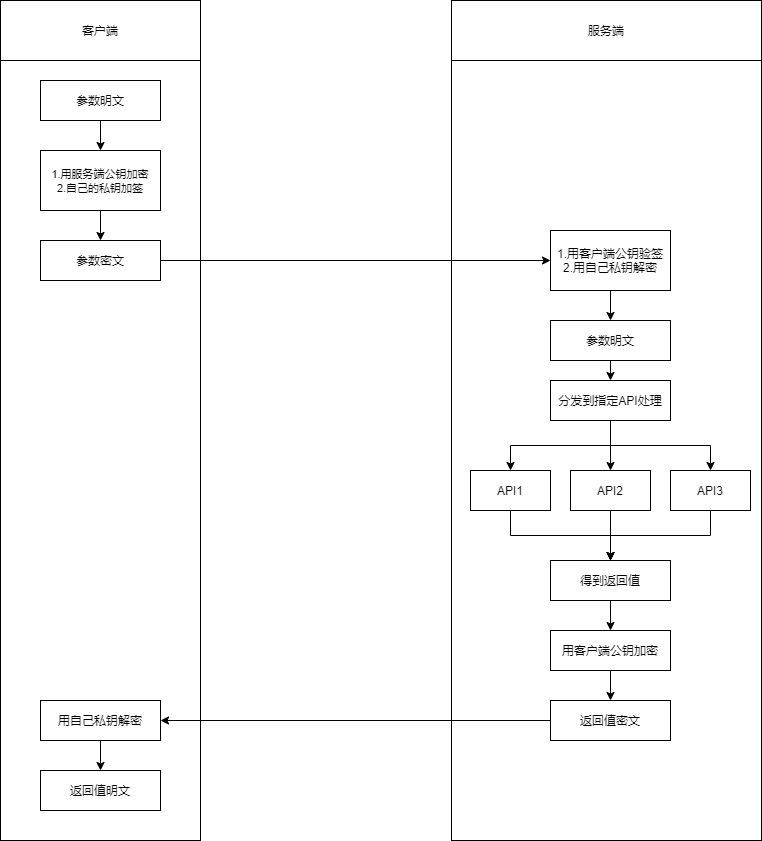基于非对称加密和验签实现接口的安全开放(openapi的实现)
背景
对外服务的接口为了安全起见,往往需要进行相应的安全处理:数据加密传输和身份认证。数据加密传输有对称加密和非对称加密两种,为了更加安全起见采用非对称加密比较好些,身份认证则采用数字签名可以实现。
程序流程

核心代码
客户端
package openapi.client.sdk;
import cn.hutool.core.util.CharsetUtil;
import cn.hutool.core.util.HexUtil;
import cn.hutool.core.util.StrUtil;
import cn.hutool.core.util.URLUtil;
import cn.hutool.crypto.SecureUtil;
import cn.hutool.crypto.SmUtil;
import cn.hutool.crypto.asymmetric.*;
import cn.hutool.http.HttpUtil;
import cn.hutool.json.JSONUtil;
import lombok.extern.slf4j.Slf4j;
import openapi.sdk.common.constant.Constant;
import openapi.sdk.common.model.AsymmetricCryEnum;
import openapi.sdk.common.model.BusinessException;
import openapi.sdk.common.model.InParams;
import openapi.sdk.common.model.OutParams;
import openapi.sdk.common.util.Base64Util;
import java.nio.charset.StandardCharsets;
import static openapi.sdk.common.util.Base64Util.bytesToBase64;
/**
* 对外开放api客户端
*
* @author wanghuidong
*/
@Slf4j
public class OpenApiClient {
private String baseUrl;
private String selfPrivateKey;
private String remotePublicKey;
private AsymmetricCryEnum asymmetricCryEnum;
private boolean retDecrypt;
/**
* 客户端系统的私钥
*
* @param baseUrl openapi基础路径
* @param selfPrivateKey 本系统私钥
* @param remotePublicKey 远程系统的公钥
* @param asymmetricCryEnum 非对称加密算法
* @param retDecrypt 返回值是否需要解密
*/
public OpenApiClient(String baseUrl, String selfPrivateKey, String remotePublicKey, AsymmetricCryEnum asymmetricCryEnum, boolean retDecrypt) {
this.baseUrl = baseUrl;
this.selfPrivateKey = selfPrivateKey;
this.remotePublicKey = remotePublicKey;
this.asymmetricCryEnum = asymmetricCryEnum;
this.retDecrypt = retDecrypt;
}
/**
* 调用openapi
*
* @param inParams 入参
* @return 返回值
*/
public OutParams callOpenApi(InParams inParams) {
//加密&加签
encryptAndSign(inParams);
//调用openapi 并 处理返回值
OutParams outParams = doCall(inParams);
return outParams;
}
/**
* 加密&加签
*
* @param inParams 入参
*/
private void encryptAndSign(InParams inParams) {
String body = inParams.getBody();
if (StrUtil.isNotBlank(body)) {
//加密
if (asymmetricCryEnum == AsymmetricCryEnum.RSA) {
RSA rsa = new RSA(null, remotePublicKey);
byte[] encrypt = rsa.encrypt(StrUtil.bytes(body, CharsetUtil.CHARSET_UTF_8), KeyType.PublicKey);
body = bytesToBase64(encrypt);
} else if (asymmetricCryEnum == AsymmetricCryEnum.SM2) {
SM2 sm2 = SmUtil.sm2(null, remotePublicKey);
body = sm2.encryptBcd(body, KeyType.PublicKey);
} else {
throw new BusinessException("不支持的非对称加密算法");
}
inParams.setBody(body);
//加签
String signedStr = null;
if (asymmetricCryEnum == AsymmetricCryEnum.RSA) {
Sign sign = SecureUtil.sign(SignAlgorithm.SHA256withRSA, selfPrivateKey, null);
//签名
byte[] data = body.getBytes(StandardCharsets.UTF_8);
byte[] signed = sign.sign(data);
signedStr = bytesToBase64(signed);
} else if (asymmetricCryEnum == AsymmetricCryEnum.SM2) {
SM2 sm2 = SmUtil.sm2(selfPrivateKey, null);
signedStr = sm2.signHex(HexUtil.encodeHexStr(body));
} else {
throw new BusinessException("不支持的非对称加密算法");
}
inParams.setSign(signedStr);
}
}
/**
* 调用远程openapi接口
*
* @param inParams 入参
* @return 结果
*/
private OutParams doCall(InParams inParams) {
String url = URLUtil.completeUrl(baseUrl, Constant.OPENAPI_PATH);
String body = JSONUtil.toJsonStr(inParams);
log.debug("调用openapi入参:" + inParams);
String ret = HttpUtil.post(url, body);
log.debug("调用openapi返回值:" + ret);
if (StrUtil.isBlank(ret)) {
throw new BusinessException("返回值为空");
}
OutParams outParams = JSONUtil.toBean(ret, OutParams.class);
if (OutParams.isSuccess(outParams)) {
log.debug("调用openapi成功");
//判断是否需要解密数据
if (retDecrypt) {
decryptData(outParams);
}
} else {
throw new BusinessException("调用openapi异常:" + outParams.getMessage());
}
return outParams;
}
/**
* 解密数据
*
* @param outParams 返回值
*/
private void decryptData(OutParams outParams) {
//解密
String decryptedData = null;
try {
if (asymmetricCryEnum == AsymmetricCryEnum.RSA) {
RSA rsa = new RSA(selfPrivateKey, null);
byte[] dataBytes = Base64Util.base64ToBytes(outParams.getData());
byte[] decrypt = rsa.decrypt(dataBytes, KeyType.PrivateKey);
decryptedData = new String(decrypt, StandardCharsets.UTF_8);
} else if (asymmetricCryEnum == AsymmetricCryEnum.SM2) {
SM2 sm2 = SmUtil.sm2(selfPrivateKey, null);
decryptedData = StrUtil.utf8Str(sm2.decryptFromBcd(outParams.getData(), KeyType.PrivateKey));
} else {
throw new BusinessException("不支持的非对称加密算法");
}
outParams.setData(decryptedData);
} catch (Exception ex) {
log.error("解密失败", ex);
throw new BusinessException("解密失败");
}
}
}


